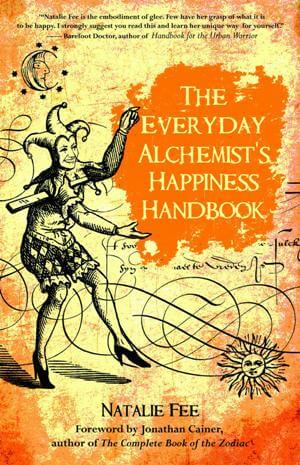The Everyday Alchemist’s Happiness Handbook
A Preface
by Natalie Fee
 These glimpses, these sparkling moments of heightened perception, inspire our quest for self-realization.
These glimpses, these sparkling moments of heightened perception, inspire our quest for self-realization.
So why choose to write a book on Happiness? Why not a book about peace or love or some other desirable virtue? Well, I, perhaps like you, was raised in a society that led me to believe that one day, if I did certain things right, I’d be happy. That if I was a good girl, if I worked hard, lived in a nice house and raised a family I’d be successful, which in turn would make me happy. Hmmm. It didn’t take long (only until I was 21, in fact, when I ended up with almost all those boxes ticked) for me to realize something was up. I was actually pretty miserable. Where was the happy ending? Why did I feel empty despite everything around me being so full?
I wasn’t alone. Over the past 10 years or more, millions of us raised with a Western mind-set have felt our “material-wealth-equals-Happiness” bubble burst and, as a result, have started shifting our focus away from the outer search for Happiness towards the inner experience: Happiness as a state of mind, as a way of being—not something to seek, but something to notice once the seeking falls away.
So that’s why. I realized that Happiness was in some way linked to, but not dependent upon, life’s events, that it could be cultivated and—perhaps most importantly—is who I am or how I feel I am when I’m not identified with suffering. As a result, I set about peeling back the layers of beliefs and habits that stood between me and Happiness. If the mystics and sages of the world were right, and that Happiness does come from a connection to our eternal nature, then I was up for discovering that for myself.
Yet for most of us, even those who understand and embrace the concept, it can still seem as if the opposite is true: that it’s the circumstances in which we find ourselves that make us happy—a well-paid job, a nice home, or a loving relationship. There’s no denying that these things can contribute to our Happiness, but no matter how convincing circumstantial Happiness may seem, it doesn’t last. It can’t last, as we mine it from finite resources that are, by their very nature, impermanent. It stands to reason, therefore, that this is why this kind of Happiness so often goes hand in hand with fear—fear of losing what we’ve got, fear of things changing from the way they are, and fear of the means by which we get our Happiness running out.
OMTimes Magazine is one of the leading on-line content providers of positivity, wellness and personal empowerment. OMTimes Magazine - Co-Creating a More Conscious Reality


